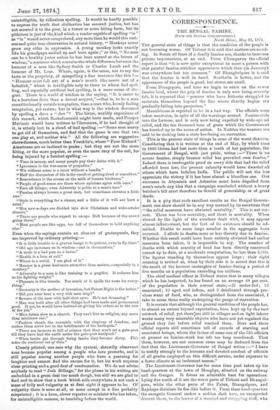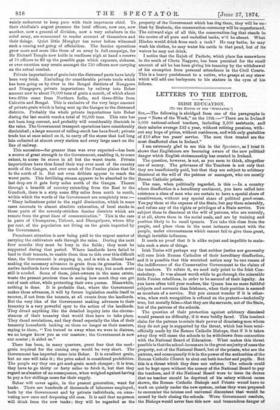CORRESPONDENCE.
THE BENGAL FAMINE.
[FROM OUR SPECIAL CORRESPONDRNT.]
North Behar, May 25, 1874. THE general state of things is that the condition of the people is not becoming worse. Of Tirhoot it is said that matters are mend- ing. In Sarun all fears of a deadly famine are, thanks to immense private importations, at an end. From Chumparun the official report is that "it is now quite exceptional to meet a person with that painful famine-stricken appearance which then (in January) was everywhere but too common." Of Bhaughulpore it is said that the famine is well in hand. Sonthalia is better, and the appearance of the people is good, but stores are small.
From Dinagepore, and here we begin to enter on the newer famine land, where the grip of famine is only now being severely felt, it is reported that " persons who have hitherto struggled to maintain themselves beyond the line where charity begins are gradually falling into pauperism."
Maunblioom is reported to be in a bad way. The officials were taken unawares, in spite of all the warnings around. Famine stole into the fortress, and is only now being expelled by wide-spr, ad relief, and the ten thousand tons of grain which the Government has hurried up to the scene of action. In Nuddea the weavers ate said to be sinking into a state bordering on starvation.
This is the present state of things in some of the worst districts. Considering that it is written at the end of May, by which time in 1866 Orissa had lost more than a tenth of her population, the Government of Bengal, with just pride, writes :—" There is no severe famine, simply because relief has prevailed over famine." Indeed there is irrefragable proof on every side that had the relief afforded been less, the present calamity would have dwarfed all others which have befallen India. The public will not the less appreciate the victory if it has been almost a bloodless one. Our successes in Abyssinia and Asbantee must have dispelled from men's minds any idea that a campaign concluded without a heavy butcher's bill must therefore be devoid of generalship or of great deeds.
It is a pity that such excellent results as the Bengal Govern- ment can show should be in any way marred by its assertions that "the relief measures have obviated mortality." This is not cor- rect. There has been mortality, and there is mortality. When viewed by the light of the numbers dealt with, it may appear almost infinitesimal, but the fact of its existence should be ad- mitted. Deaths to some large number in the aggregate have occurred. I allude to deaths more or less directly due to famine. Whether this result could have been entirely obviated bad earlier measures been taken, it is impossible to say. The number of deaths with which scarcity of food has been directly concerned cannot up to date, at a moderate computation, be less than 2,000. The figures standing by themselves appear large ; their right meaning is arrived at, when by their side it is stated that this is the result of the keenest onslaughts of famine during a period of five months on a population exceeding ten millions.
The chief medical officer in Tirhoot states that in many villages which he has inspected, he has found on an average 49 per cent. of the population in their normal state,-27 under-fed ; 12 emaciated ; 10 aged and infirm, and 2 debilitated through pre- vious want of food, who, as distinguished from the emaciated, I take to mean those really undergoing the pangs of starvation.
It is certain that although the general condition of the people has, to almost an extent beyond expectation, been kept up by the vast network of relief, yet they ;are still in villages and on light labour works many very miserable objects who have not yet regained the ground they lost before relief reached them. Here and there official reports still sometimes tell of crowds of starving and emaciated beings, whom the laches of some one of the 750 officials at present on famine-work has left too long unrelieved. That these, however, are not common cases may be deduced from the fact that the Lieutenant-Governor of Bengal writes :—" I have to testify strongly to the humane and devoted conduct of officials of all grades employed on this difficult service, under exposure to a fierce climate at an inclement season."
The Lieutenant-Governor has for some time past taken up his
head-quarters at the town of Monghyr, situated on the railway and the Ganges. It forms an admirable base for operations. Lying due north of it are the worst parts of Tirhoot and Bb augul- pore, while the other parts of the Patna, Bhaugulpore, and Rajahaye divisions lie fan-like before it. From these head-quarters the energetic General makes a sudden dash here, an unexpected descent there, to the horror of a wearied and straggling staff, who
vainly endeavour to keep pace with their impetuous chief. To their chieftain's august presence the local officers, now one, now another, now a general of division, now a very subaltern in the relief army, are summoned to render account of themselves and their doings. Quiet little Monghyr has never before witnessed such a coming and going of officialdom. The famine operations grow more and more like those of an army in full campaign, for Sir Richard Temple now holds in readiness nigh at hand a reserve of 70 officers to fill up the possible gaps which exposure, sickness, or over-exertion may create amongst the 750 officers now carrying on the actual combat.
Private importations of grain into the distressed parts have lately been very brisk. Excluding the considerable private trade which has been going on by river in the Bengal districts of Rungpore and Dinagepore, private importations by railway into Behar amount now to about 70,000 tons of grain a month, of which about two-fifths come from Northern India, and three-fifths from Calcutta and Bengal. This is exclusive of the very large amount of private grain which is being sent up the Ganges to the distressed districts. Probably the whole private importations into Behar during the last month reach a total of 90,000 tons. This rate has not been long current, and probably will considerably diminish in the rains. The Government transport operations have considerably diminished ; a large amount of rolling-stock has been freed ; private trade has at once seized on it, to carry off the stores that had long lain collected at almost every station and every large mart on the line of railway.
This accession—far greater than was ever expected—has been a source of great strength to the Government, enabling it, to some extent, to nurse its stores in all but the worst tracts. Private importations have thus found their way over most of the country south of the Ganges, and over much of the Famine plains that lie to the north of it. But not even driblets appear to reach the worst parts. This fertilising stream appears to be absorbed to the last drop ere it gets forty miles north of the Ganges. Thence through a breadth of country extending from the Kasi to the Gunduck, there is a strip some fifty miles from north to south, within which the words of the Government are completely true :— " Many indications point to the rapid diminution, which in some cases amounts to almost absolute exhaustion, of local stocks in those parts of the severely-stricken famine districts which are remote from the great lines of communication." This is the case in parts of Chumparun, Tirhoot, and Bhaugulpore, where fifty per cent. of the population are living on the grain imported by the Government.
Prominent attention is now being paid to the urgent matter of carrying the cultivators safe through the rains. During the next four months they must be busy in the fields ; they must be supported during that period. Where landlords have failed to lend to their tenants, to enable them thus to tide over this difficult time, the Government is stepping in, and is with a liberal hand making the necessary advances in grain from its granaries. The native landlords have done something in this way, but much more still is needed. Some of them, joint-owners in the same estate, waste the present precious time in seeing how much they can get out of each other, while protecting their own purses. Meanwhile, nothing is done. It is probable that, where the Government makes these advances, it will by future legislation enable itself to recover, if not from the tenants, at all events from the landlords. But the very idea of the Government making advances to their tenantry is a very powerful spur to the action of the landlords. They dread anything like the detailed inquiry into the circum- stances of their tenantry that would then have to take place.
They dread revelations, and they dread especially the idea of their tenantry henceforth looking on them no longer as their masters,
saying to them, " You turned us away when we were in distress, WO no longer know you as our masters ; the Government is now our master ; it aided us."
There has been, in many quarters, great fear that the seed- grain required for the coming crop would be very short. The Government has imported some into Behar. It is excellent grain, but no one will take it ; the price asked is considered prohibitive. The people say they can get seed-grain much cheaper; it is true, they have to go thirty or forty miles to fetch it, but that they regard as *emitter of no consequence, when weighed against having to pay a few shillings more for their supply.
Behar will never again, in the present generation, want for tanks. There are hundreds of thousands of labourers employed, both by the Government and by private individuals, on exca- vating new ones and deepening old ones. It is said that no person will drink from the new tanks ; they will be regarded as the
property of the Government which has dug them, they will be un- blest by Brahmin, the consecration-ceremony will be unperformed. The outward sign of all this, the consecration-log that stands in the centre of all pure and undefiled tanks, 7;11 be absent. What. Hindoo would drink from such a tank? He may bathe, he may wash his clothes, he may water his cattle in that pond, but of its waters he may not drink.
I notice that the Rajah of Pachete, which place lies somewhere- in the south of Chota Nagpore, has been punished for the small amount of aid he has been giving his tenantry by the withdrawal of his exemption from personal attendance in the Civil Courts. This is a heavy punishment to a native, who grasps at any straw which will add one barleycorn to his stature in the eyes of his I fellows.



































 Previous page
Previous page